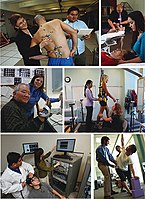
Photo from wikipedia
Resistance training enhances muscular force due to a combination of neural plasticity and muscle hypertrophy. It has been well documented that the increase in strength over the first few weeks… Click to show full abstract
Resistance training enhances muscular force due to a combination of neural plasticity and muscle hypertrophy. It has been well documented that the increase in strength over the first few weeks of resistance training (i.e. acute) has a strong underlying neural component and further enhancement in strength with long-term (i.e. chronic) resistance training is due to muscle hypertrophy. For obvious reasons, collecting long-term data on how chronic-resistance training affects the nervous system not feasible. As a result, the effect of chronic-resistance training on neural plasticity is less understood and has not received systematic exploration. Thus, the aim of this review is to provide rationale for investigating neural plasticity beyond acute-resistance training. We use cross-sectional work to highlight neural plasticity that occurs with chronic-resistance training at sites from the brain to spinal cord. Specifically, intra-cortical circuitry and the spinal motoneuron seem to be key sites for this plasticity. We then urge the need to further investigate the differential effects of acute versus chronic-resistance training on neural plasticity, and the role of this plasticity in increased strength. Such investigations may help in providing a clearer definition of the continuum of acute and chronic-resistance training, how the nervous system is altered during this continuum and the causative role of neural plasticity in changes in strength over the continuum of resistance training.
Journal Title: European journal of applied physiology
Year Published: 2021
Link to full text (if available)
Share on Social Media: Sign Up to like & get
recommendations!